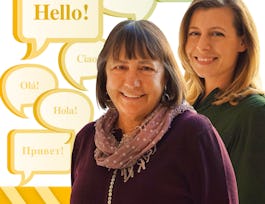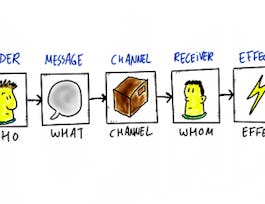This course will teach you how to build persuasive surprises into your presentations, the kind of surprises that will change how your audience sees a particular situation or proposal and then gets them talking—in a good way. It will also identify several techniques you can use to start (and maintain) your own conversations, whether with a big group, a small group, or even just one-on-one.



Speaking and Presenting: Conversation Starters
This course is part of Good with Words: Speaking and Presenting Specialization

Instructor: Patrick Barry
Sponsored by IEM UEM Group
20,403 already enrolled
(57 reviews)
What you'll learn
How to incorporate a "little bit of mischief" to your presentations in a way that delights and informs your audience
How to use "mirroring" and follow-up questions to establish trust and build rapport
How to connect with people via the "language of common life"
How to reimagine the experience of starting a conversation with a stranger
Skills you'll gain
Details to know

Add to your LinkedIn profile
9 assignments
See how employees at top companies are mastering in-demand skills

Build your subject-matter expertise
- Learn new concepts from industry experts
- Gain a foundational understanding of a subject or tool
- Develop job-relevant skills with hands-on projects
- Earn a shareable career certificate


Earn a career certificate
Add this credential to your LinkedIn profile, resume, or CV
Share it on social media and in your performance review

There are 4 modules in this course
“Be surprising, in a convincing way.” You’ll encounter those words a lot during this course. To discover who said them and how you can put them to work, check out the materials in Week 1!
What's included
7 videos14 readings2 assignments2 discussion prompts
A great way to create a message that people not only listen to but actually remember is to include what the behavioral economist George Lowenstein calls “information gaps.” We’ll learn what those are this week. We’ll also meet a scientist who does something remarkable: makes talking about the life of grass really interesting.
What's included
3 videos3 readings2 assignments2 discussion prompts
Those of you who have taken the companion series Good with Words: Writing and Editing may remember the following advice: “Trying to sound smart is a pretty dumb strategy.” We’ll learn this week that it also applies to speaking and presenting. Don’t try to impress your audience. Don’t set out to wow them with your intellect. Focus instead on being helpful. Treat your words like they are a gift you really want to share.
What's included
6 videos4 readings2 assignments3 discussion prompts
Congratulations! You’ve made it to the fourth and final week of Course 3. We’re going to start by looking at the difference between a high-considerateness speaking style and a high-involvement one. But we’ll also make time for some surprising findings about what you can do to make your next commute a little more pleasant and stimulating--not just for you but also for a complete stranger.
What's included
3 videos7 readings3 assignments6 discussion prompts
Instructor

Offered by
Why people choose Coursera for their career




Learner reviews
57 reviews
- 5 stars
75.43%
- 4 stars
15.78%
- 3 stars
5.26%
- 2 stars
0%
- 1 star
3.50%
Showing 3 of 57
Reviewed on Apr 9, 2023
Great course to help navigate better speaking and engagement!
Reviewed on Sep 12, 2021
Course was concise, but provided good insight and links to additional materials that helped support the content.
Reviewed on Sep 18, 2024
Helpful in letting you discover how to communicate effectively
Recommended if you're interested in Personal Development

Georgia Institute of Technology

University of Amsterdam

Open new doors with Coursera Plus
Unlimited access to 10,000+ world-class courses, hands-on projects, and job-ready certificate programs - all included in your subscription
Advance your career with an online degree
Earn a degree from world-class universities - 100% online
Join over 3,400 global companies that choose Coursera for Business
Upskill your employees to excel in the digital economy




